牛津英语九年级上册全书语法知识汇总
Unit1语法知识点汇总牛津译林版英语九年级上册
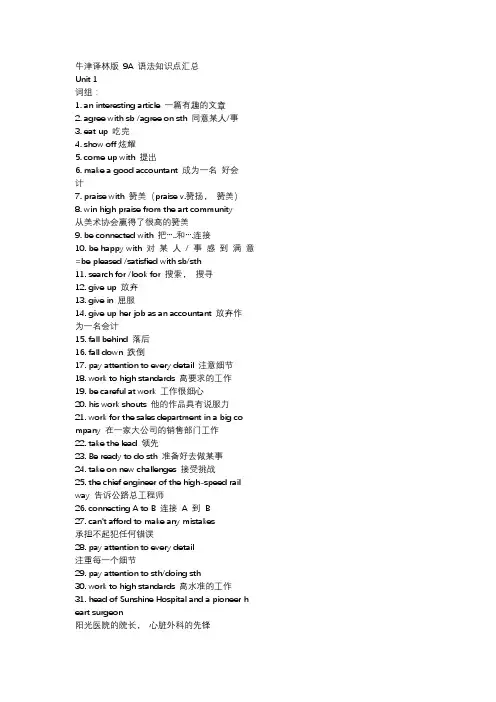
牛津译林版9A 语法知识点汇总Unit 1词组:1. an interesting article 一篇有趣的文章2. agree with sb /agree on sth 同意某人/事3. eat up 吃完4. show off炫耀5. come up with 提出6. make a good accountant 成为一名好会计7. praise with 赞美(praise v.赞扬,赞美)8. win high praise from the art community从美术协会赢得了很高的赞美9. be connected with 把…..和….连接10. be happy with 对某人/ 事感到满意=be pleased /satisfied with sb/sth11. search for /look for 搜索,搜寻12. give up 放弃13. give in 屈服14. give up her job as an accountant 放弃作为一名会计15. fall behind 落后16. fall down 跌倒17. pay attention to every detail 注意细节18. work to high standards 高要求的工作19. be careful at work 工作很细心20. his work shouts 他的作品具有说服力21. work for the sales department in a big co mpany 在一家大公司的销售部门工作22. take the lead 领先23. Be ready to do sth 准备好去做某事24. take on new challenges 接受挑战25. the chief engineer of the high-speed rail way 告诉公路总工程师26. connecting A to B 连接A 到B27. can’t afford to make any mistakes承担不起犯任何错误28. pay attention to every detail注重每一个细节29. pay attention to sth/doing sth30. work to high standards 高水准的工作31. head of Sunshine Hospital and a pioneer h eart surgeon阳光医院的院长,心脏外科的先锋32. you can’t be too careful.再怎么仔细也不为过。
牛津译林版九年级英语上册全书语法知识点归纳大全(9A Unit 1-8 )
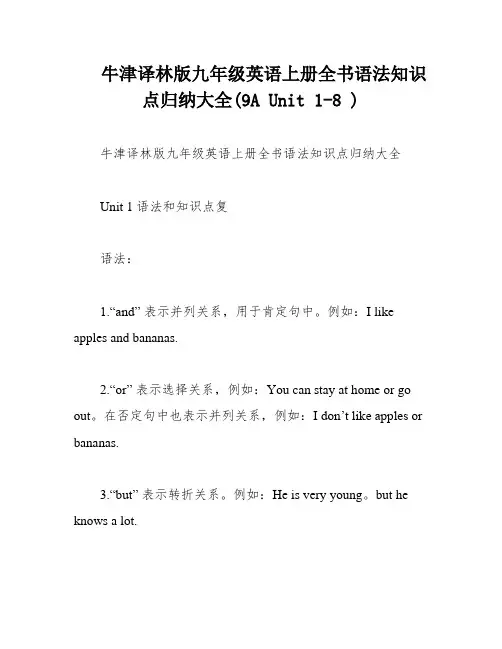
牛津译林版九年级英语上册全书语法知识点归纳大全(9A Unit 1-8 )牛津译林版九年级英语上册全书语法知识点归纳大全Unit 1 语法和知识点复语法:1.“and” 表示并列关系,用于肯定句中。
例如:I like apples and bananas.2.“or” 表示选择关系,例如:You can stay at home or go out。
在否定句中也表示并列关系,例如:I don’t like apples or bananas.3.“but” 表示转折关系。
例如:He is very young。
but he knows a lot.4.“so” 表示因果关系。
例如:He got up late。
so he was late for school.5.“both …and…” 连接两个主语时,谓语动词用复数形式。
例如:Both Lucy and Lily study hard.6.“XXX…nor…” 和“either … or…” 和“not only…but also…” 连接两个主语时,谓语动词要和最近主语保持一致(就近原则)。
例如:XXX she knows it.知识点:1.Look at the sign。
it “says” “No smoking”。
(注意用词)2.“Make” 做“使,让”的三种用法:a。
make sb +形容词b。
make sb +动词原形c。
be made to do sth.例如:It XXX.3.“Let” 做“使,让” 时句型:XXX.4.“Agree with sb” 同意某人的意见。
5.“Eat up” 吃光。
6.“Keep…in good order” 使…保持井然有序。
7.“Show off” 。
8.形容词+ “enough to do sth” 足够…可以做某事。
9.“Come up with” 想出注意。
10.“XXX…” 对…很好奇。
英语九年级牛津上册知识点
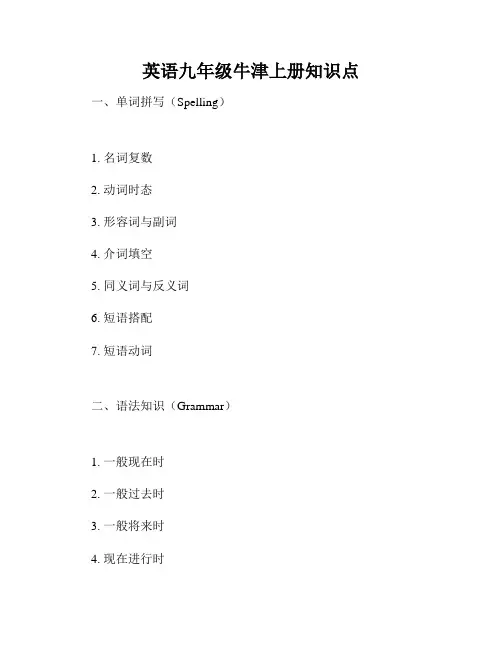
英语九年级牛津上册知识点一、单词拼写(Spelling)1. 名词复数2. 动词时态3. 形容词与副词4. 介词填空5. 同义词与反义词6. 短语搭配7. 短语动词二、语法知识(Grammar)1. 一般现在时2. 一般过去时3. 一般将来时4. 现在进行时5. 过去进行时6. 现在完成时7. 过去完成时8. 情态动词9. 被动语态10. 定语从句11. 状语从句12. 条件状语从句13. 直接引语与间接引语14. 名词性从句三、阅读理解(Reading Comprehension)1. 初步理解文章大意2. 阅读文章细节3. 推理与判断4. 作者意图5. 标题归纳概括6. 段落提炼主题7. 阅读技巧与策略四、写作技巧(Writing Skills)1. 写作计划与提纲2. 写作过程与写作顺序3. 描述与叙事文4. 说明与议论文5. 书信与邮件6. 日记与校园文化7. 环境保护与社会责任8. 面试技巧与自我介绍9. 写作常见错误与纠正方法五、口语表达(Oral Expression)1. 日常问候与交际用语2. 电话沟通与预约3. 请求与邀请4. 建议与警告5. 表达意见与观点6. 口头报告与演讲7. 听力技巧与辨音训练六、听力技巧(Listening Skills)1. 听取关键信息2. 根据上下文推测语义3. 听力笔记与记录4. 多种类型听力材料5. 听取细节与支持事实6. 听力长文理解与填空7. 听力短文判断与选择七、词汇运用(Vocabulary)1. 词义辨析与用法选择2. 词根、前缀与后缀3. 同义词与反义词搭配4. 词汇拓展与应用5. 词汇积累与记忆方法6. 同源词与词族7. 词类转换与固定搭配总结:以上为英语九年级牛津上册的知识点概述,内容涵盖了单词拼写、语法知识、阅读理解、写作技巧、口语表达、听力技巧以及词汇运用等多个方面。
通过学习这些知识点,同学们可以提升自己的英语水平,提高听、说、读、写的能力。
牛津译林版初中英语九年级上下册全册知识点归纳总结【推荐】
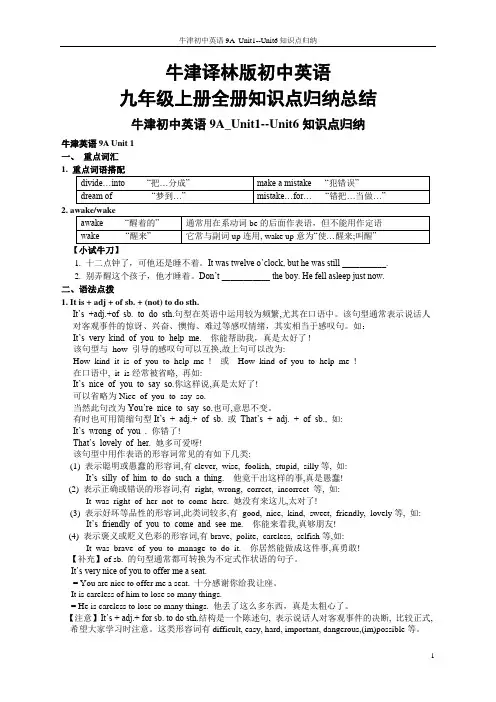
牛津译林版初中英语九年级上册全册知识点归纳总结牛津初中英语9A_Unit1--Unit6知识点归纳牛津英语9A Unit 1一、重点词汇1.【小试牛刀】1. 十二点钟了,可他还是睡不着。
It was twelve o’clock, but he was still __________.2. 别弄醒这个孩子,他才睡着。
Don’t ___________ the boy. He fell asleep just now.二、语法点拨1. It is + adj + of sb. + (not) to do sth.It’s +adj.+of sb. to do sth.句型在英语中运用较为频繁,尤其在口语中。
该句型通常表示说话人对客观事件的惊讶、兴奋、懊悔、难过等感叹情绪,其实相当于感叹句。
如:It’s very kind of you to help me. 你能帮助我,真是太好了!该句型与how 引导的感叹句可以互换,故上句可以改为:How kind it is of you to help me ! 或How kind of you to help me !在口语中, it is经常被省略, 再如:It’s nice of you to say so.你这样说,真是太好了!可以省略为Nice of you to say so.当然此句改为You’re nice to say so.也可,意思不变。
有时也可用简缩句型It’s + adj.+ of sb. 或That’s + adj. + of sb., 如:It’s wrong of you . 你错了!That’s lovely of her. 她多可爱呀!该句型中用作表语的形容词常见的有如下几类:(1) 表示聪明或愚蠢的形容词,有clever, wise, foolish, stupid, silly等, 如:It’s silly of him to do such a thing. 他竟干出这样的事,真是愚蠢!(2) 表示正确或错误的形容词,有right, wrong, correct, incorrect 等, 如:It was right of her not to come here. 她没有来这儿,太对了!(3) 表示好坏等品性的形容词,此类词较多,有good, nice, kind, sweet, friendly, lovely等, 如:It’s friendly of you to come and see me. 你能来看我,真够朋友!(4) 表示褒义或贬义色彩的形容词,有brave, polite, careless, selfish等,如:It was brave of you to manage to do it. 你居然能做成这件事,真勇敢!【补充】of sb. 的句型通常都可转换为不定式作状语的句子。
牛津译林版九年级英语上学期语法知识点讲解--宾语从句(一)
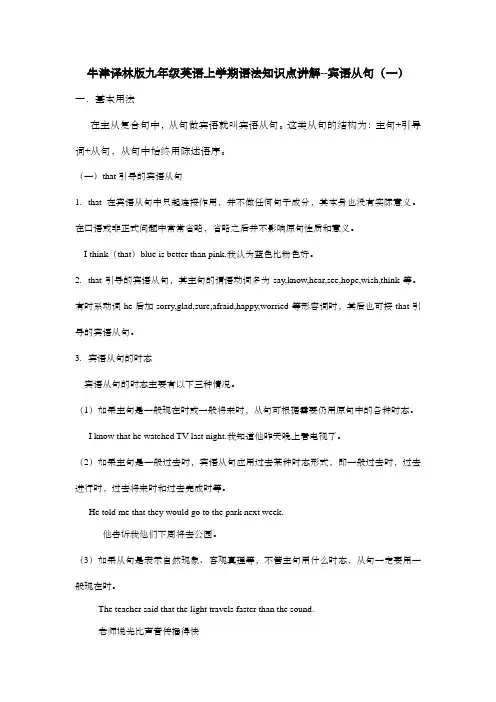
牛津译林版九年级英语上学期语法知识点讲解--宾语从句(一)一.基本用法在主从复合句中,从句做宾语就叫宾语从句。
这类从句的结构为:主句+引导词+从句,从句中始终用陈述语序。
(一)that引导的宾语从句1.that 在宾语从句中只起连接作用,并不做任何句子成分,其本身也没有实际意义。
在口语或非正式问题中常常省略,省略之后并不影响原句性质和意义。
I think(that)blue is better than pink.我认为蓝色比粉色好。
2.that引导的宾语从句,其主句的谓语动词多为say,know,hear,see,hope,wish,think等。
有时系动词he后加sorry,glad,sure,afraid,happy,worried等形容词时,其后也可接that引导的宾语从句。
3.宾语从句的时态宾语从句的时态主要有以下三种情况。
(1)如果主句是一般现在时或一般将来时,从句可根据需要仍用原句中的各种时态。
I know that he watched TV last night.我知道他昨天晚上看电视了。
(2)如果主句是一般过去时,宾语从句应用过去某种时态形式,即一般过去时,过去进行时,过去将来时和过去完成时等。
He told me that they would go to the park next week.他告诉我他们下周将去公园。
(3)如果从句是表示自然现象、客观真理等,不管主句用什么时态,从句一定要用一般现在时。
The teacher said that the light travels faster than the sound.老师说光比声音传播得快(二)if/whether引导的宾语从句宾语从句中,if和whether都可以做引导词,意为“是否”,在一般情况下可以互换。
If多用于口语或非正式文体中,whether多用于比较正式的文体中。
二、特殊用法1.一般来说,that引导宾语从句时常常可以省略,但当一个句子中有两个或更多的由that 引导的宾语从句并列时,仅可以省略第一个连接词that,后面的连接词that则不能省略。
牛津上海版英语九年级上册全书语法知识汇总
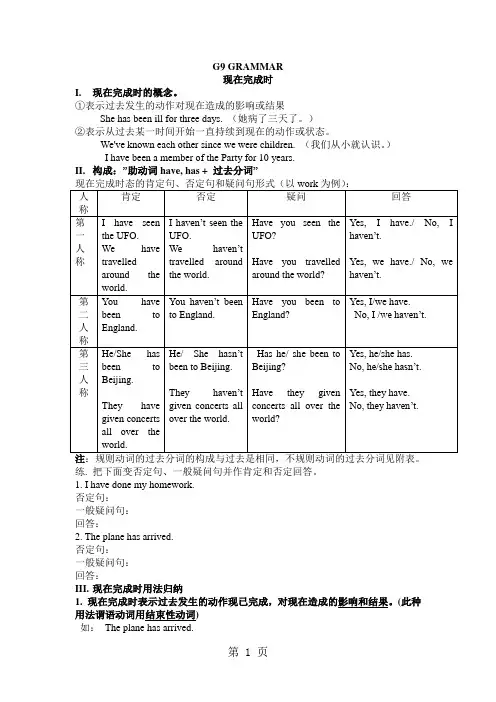
G9 GRAMMAR现在完成时I.现在完成时的概念。
①表示过去发生的动作对现在造成的影响或结果She has been ill for three days. (她病了三天了。
)②表示从过去某一时间开始一直持续到现在的动作或状态。
We've known each other since we were children. (我们从小就认识。
)I have been a member of the Party for 10 years.II.构成:”助动词have, has + 过去分词”练. 把下面变否定句、一般疑问句并作肯定和否定回答。
1. I have done my homework.否定句:_______________________________________一般疑问句:___________________________________回答:_________________________________________2. The plane has arrived.否定句:_______________________________________一般疑问句:___________________________________回答:_________________________________________III.现在完成时用法归纳1. 现在完成时表示过去发生的动作现已完成,对现在造成的影响和结果。
(此种用法谓语动词用结束性动词)如:The plane has arrived.常用的时间状语和副词:already (已经) 用于肯定句中,位置比较灵活,但通常放在have/ has 与过去分词之间如:I have already done my homework.yet (还,仍然,已经) 用于否定句和疑问句的句末。
如:Has she finished cooking yet? 他做完饭了吗?练:I have already done my homework. (变为否定句)_________________________________ever (曾经),句中,多用于疑问句如:Have you ever been to Shanghai?never (从不) ,本身否定;before (以前),句尾,独立用;just (刚刚),用于肯定句中,常用在助动词和过去分词之间。
牛津译林版九年级英语上册Unit 1 知识梳理
Unit 1 Know yourself知识梳理知识点一重点短语1. eat it/them up把它/它们吃光2. keep all her things in good order使她的所有的东西保持井然有序3. show off炫耀4. be patient enough to repeat grammar rulers for us 足够有耐心为我们重复语法规则5. come up with new ideas 想出新点子6. neither--- nor---既不……也不……7. a born artist 一个天生的艺术家8. win high praise from the art community 赢得来自艺术界的高度赞扬9. the general manager of the company公司的总经理10. pay attention t o sth/ doing sth.注意某事/做某事11. work to high standard s按高标准工作12. a pionee r heart surgeon一位心脏科方面的先驱13. be impatient with patients对病人没有耐心的14. think twice (about sth)三思而行15. do the dishes洗碗16. in the Chinese lunar calendar在中国农历里17. appear in a fixed order 按照固定的顺序出现18. make his lessons interesting and lively使他的课生动有趣19. in all总计,总共20. divide...into...把……分成……21. That’s not the case.情况并非如此22. make a speech做演讲23. be absent from school缺课24. agree with sb. 同意某人观点25. It says 上面写着(it指代newspaper/magazine/poster等)26. It’s said/reported/believed that据说/据报道/人们相信……27. be curious about everything 对一切都感到好奇28. all day long/ the whole day 整天(2种)29. work with numbers day after day 日复一日和数字打交道30. impress the whole country with his creative work 以他创作性的作品让整个国家印象深刻31.be easy to work with 容易共事32. be willing to work extra hours 乐意加班33. do operations on sb.= operate on sb. 给某人做手术34. devote most of her time to her work 把她大部分的时间都致力于她的工作35. devote all her life to helping poor children 把她的一生都致力于帮助贫困儿童36. be suitable for the job/ being an artist 适合这个工作/做一名艺术家37. be loyal to 对某人忠诚38. depend on your date of birth 取决于你的出生日期39. win several science competitions 赢得好几个科技竞赛40. forget the things(that)he needs to do 忘记他需要做的事41. get himself more organized 使他自己更有条理42. recommend sb. as our monitor 推荐某人为我们的班长43. the most suitable person to be our monitor 最适合当我们班长的人选44. like to talk much 喜欢多说45. his work shouts 他的作品很有说服力46. give up her job as an accountant 放弃她作为会计的工作give up doing sth. 放弃做某事47. read about them for fun 读他们仅为乐趣48. remain the same throughout your life 在你的一生中保持不变49. successfully complete a difficult task through hard work 通过辛勤工作成功地完成一项困难的任务50. pass sth. onto sb. 把某事传给某人51. be formed by both nature and the environment 即由自然又受环境影响形成知识点二重点句型1. Neither my parents nor I think I can make a good accountant.我的父母和我都认为我不可能成为一个号的会计。
牛津上海版九年级英语上册全册知识点归纳
牛津上海版九年级英语上册全册知识点归纳Unit One Ancient Greece单词(见课文后的word box)词组1. come down the stairs2. go up the stairs3. no longer4. look down at5.beyond the empty plain6. capture the city7. sail away8. take sth. with sb.9. outside the main gate10. a huge (giant) wooden horse11. pull sth.12. obey orders13. drag sth.14. with ropes15. all the citizens16. make jokes about17. make sure18. be securely locked19. including sb. / sth.20. except for21. wait for another hour22. in the darkness23. enter the city24. seize the captain25. by doing sth.26. succeed in doing sth.重点句型1. Outside the main gates of the city stood a huge wooden horse.2. You have to obey orders.3. The Trojans made sure all the gates of the city were securely locked, and they all went to sleep, including the gate guards.4. By midnight, the square was empty, except for the giant horse.5. In one night, they succeeded in capturing it through a trick.6. The Greeks have tried for ten years to capture our city.7. The wooden horse is so big that they can’t take it with them.8. No guards stopped them as they opened the main gates.9. The Greek Army had returned in the darkness when the citizens were celebrating inside.语法The present perfect tenseEg. They have just / already gone. / She has not gone yet.Have you ever visited China?Yes, I have. / No, I have never visited it.I have been here since 1998.She has been there for an hour.Unit Two Traditional skills单词(见课文后的word box)词组1. be of average height2. be fit3. catch fish4. be strong enough to do sth.5. control the raft6. be good at doing sth.7. be used to do sth.8. push sb. / sth.9. up to10. require… to do sth.11. in the late afternoon12. set off13. reach the right place14. tie sth.around…15. enable sb. to do sth.16. bring back17. remove sth. from…18. a traditional Chinese skill19. be interested in doing sth.20. a fishing rod重点句型1. Damin sits on the side of the river cooking a meal, with a large bird on his head.2. He is thin, and of average height, but he is very fit.3. Although he is an elderly man, he is strong enough to control his raft in the river where he lives and works with his cormorants.4. They can dive down 25 meters, and stay underwater for up to two minutes.5. Damin’s fishing trips often begin in the late afternoon.6. He sets off on his bamboo raft with his birds.7. He ties a piece of grass around the neck of each bird, so that it cannot swallow the fish.8. Later some of the fish are sold, and the rest are divided between Damin’s family and the cormorants.9. In 50 years, perhaps there will be no more cormorant fishermen in the world.10. The light enables Damin to see better and also attracts the fish.语法1. Passive voice (1)Eg. Some of the fish are sold by Damin’s wife.The picture is / was / will be painted / sold in China.The pictures are / were / will be painted / sold in China.Unit Three Pets单词(见课文后的word box)词组1. be allowed to do sth.2. lots of reasons for…3. be really cute4. pick up5. hold…in one’s arms6. learn about… from…7. play with8. take care of9. care for10. respect all living things11. love sb. faithfully12. in one’s opinion13. create a lot of mess14. need to be done15. take sb. for a walk16. as a result17. bark at18. frighten sb.19. stop sb. from doing sth.20. a small number of21. what’s more22. have no choice but to do sth.23. make sb. do sth.24. be extremely unhappy重点句型1. It’s nice to pick them up and hold them in our arms.2. Young people can learn how to care for others and how to respect all living things by keeping a pet dog.3. As a result, these dogs create a lot of mess on the streets and in parks.4. They always need fresh air and large open spaces where they can run free.5. I think that having a pet dog can change a person’s life.6. It’s wonderful to see them growing up quickly.7. According to my mum, this helps us become more responsible people.8. Paying for dog food and visiting the vet can be expensive.语法1. Passive voice (2)The work can be finished in a week.The work cannot be finished in a week.Can the work be finished in a week?2. Using adverbsA dog will love you faithfully for many years.The dog became extremely unhappy.Luckily, the animal shelter saved the poor dog in time.Unit Four Computers单词(见课文后的word box)词组1. smaller and smaller2. be the size of…3. be small enough to do sth.4. a bar of chocolate5. be unaware of6. depend on7. common knowledge8. super calculators9. electronic brains10. the answer to…11. for the time being12. raise some questions 13. spend one’s lives14. recognize one’s voice 15. obey one’s commands16. millions of pages 17. contain pictures, videos and sounds18. read about19. a video of him20. more popular重点句型1. Other kinds of computers are so tiny that you may be unaware of them.2. It is common knowledge that computers are super calculators.3. However, one day computers may be able to do most things that a human brain can do and even do them better.4. You can buy a program which helps the computer recognize your voice.5. Many of today’s computers have CD-ROM or DVD-ROM drives.6. For example, you can use your computers to read about a famous person from history and you can see a photograph or video of him or her, and even listen to them speaking.7. Since then computers have become smaller and smaller.8. Desktop computers are the size of televisions.9. Palmtop computers are small enough to put it in your pocket like a bar of chocolate.10. There is probably a computer inside your TV, telephone, or washing machine.11. You probably depend on computers more than you realize.12. More importantly, computers can operate railways and fly aeroplanes and spaceships.13. Computers may be better than doctors at doing their job.14. What will happen to us if computers can do our jobs?15. You do not even need to know how to type.语法parison of adjectivesIn the 1940s, the first computers were bigger than cars.These new chairs are more comfortable than the old ones.Simon is the tallest boy in our class.This is the most intelligent robot I have ever seen.2. Comparison of adverbsPhilip sings more beautifully than you do.Eric completed the science test (the) most quickly in our class.Tom can jump higher than David.Plants live the longest of all things on the earth.Unit Five The human brain单词(见课文后的word box)词组1. a feature about memory2. agree to do sth.3. a short-term memory4. a long-term memory5. tell a joke6. lose one’s memory7. be essential for…8. a programme on television9. injure one’s brain10. be angry with11. one basic way of doing sth.12. improve one’s memory13. in one’s mind14. the correct order15. play cards16. be connected with17. something dramatic18. the opening ceremony19. some amazing stories20. go wrong重点句型1. When people get old, their short-term memory becomes weaker, but they can still remember things that happened a long time ago.2. I saw a programme on television about a man who had had an accident and injured his brain.3. An easy way to do this is to imagine there is a ‘mile’ between the first letter and the last letter.4. He remembered the correct order of 2704 playing cards, after seeing them just once.5. Most people in China can remember where they were when the opening ceremony of the 29th Olympic Games was held in Beijing in 2008.6. I can’t remember what the other two things are.7. One basic way of improving your memory is to use the link method.8. In the Guinness Book of Records, we can find some amazing stories about memory.9. If you want to memorize something, you should make a picture in your mind.语法Adverbial clauses (2)1.If you cool water, it turns into ice.2. What will you do if you fail the driving test?If you pass the driving test, what will you do?3. I won’t buy a car if I fail the test.4. Unless you keep ice cream in a freezer, it melts.5. You will be late for school unless you leave now.You will be late for school if you don’t leave now.Unit Six Detectives单词(见课文后的word box)词组1. an article on…2. interview sb.3. deal with a case4. live alone5. purchase sth. for 200 dollars6. show sth. to sb.7. in the safe8. report the theft9. look for clues10. a black pearl earring (necklace) 11. be spotlessly clean12. deny doing sth.13. jump to conclusion14. steal sth. from sb.15. no longer16. break into17. question sb.18. in the end19. admit doing sth.20. make sure21. go to jail22. instead of23. be behind bars24. protect the innocent25. find the guilty重点句型1. To get information, she interviewed Detective Ken.2. Let me tell you about a recent case that I dealt with.3. My job is to protect the innocent as well as find the guilty.4. You say (that) you like being a detective5. I noticed that Jill was wearing a black pearl necklace.6. I decided what to do next.7. The insurance company would pay him 300,000 dollars if the vase was stolen.8. That’s why I like being a detective.语法Infinitives1. Pansy wanted to get information for her article.2. Mr Jones expected the insurance company to pay him 300,000 dollars for the vase.3. I decided what to do next.4. Ken has got the ability to be a great detective.5. Pancy made a promise to write an article on detectives.Unit Seven Escaping from kidnappers单词(见课文后的word box)词组1. comic strip2. think of a plot3. with an exciting finish4. something new5. strong personalities6. a line of text7. sound effect8. add…to…9. make…more interesting10. come to life11. be mainly told12. escape from13. burst out doing…14. without borders重点句型1. The first thing to do when creating a comic strip is to think of a plot.2. It needs to be funny or dramatic with an exciting finish.3. It should be full of action to keep the reader interested.4. Some frames can be left without borders to add variety.语法Using adjectives1.He was a plump, middle-aged man.2.He had thinning , black hair, and a little moustache.3.She looks happy.4.It is easy to draw cartoons.5.Frame sizes varied to make the strip more interesting.6.It should be full of action to keep the reader interested.。
牛津译林九年级上学期英语知识点汇总
牛津译林九年级上学期英语知识点汇总牛津译林九年级上学期英语知识点汇总一、文章类型本学期牛津译林英语教材涵盖了多种不同类型的文章,包括记叙文、说明文、议论文等。
这些文章不仅提供了丰富的语言学习材料,还帮助学生了解不同文体特点以及提高阅读理解能力。
二、知识点梳理1、词汇:本学期学习的新词汇主要涉及日常生活、学校、家庭、社会等方面,如:uniform、essay、promise、concert、promise等。
2、语法:本学期学习的语法知识点包括句子结构、时态、语态、主谓一致等。
例如,学生需要掌握如何正确使用一般现在时、一般过去时、一般将来时等基本时态。
3、阅读理解:学生需要通过阅读文章,理解文章的主旨、细节和推理能力,同时需要注意理解文章的文体特点、篇章结构和语言风格。
4、写作技巧:学生需要掌握不同类型文章的写作技巧,如记叙文、说明文和议论文等。
此外,还需要注意语法、拼写和标点等方面的规范。
5、听力技能:学生需要通过听力练习,提高听力理解能力,包括听取并记录关键信息、理解对话中的意图和情感等。
6、口语表达:学生需要通过口语练习,提高口语表达能力,包括朗读、复述、描述和辩论等。
三、拓展延伸在学习过程中,学生还可以通过以下方式拓展延伸:1、阅读英语原著:学生可以选择一些适合自己阅读水平的英语原著进行阅读,如经典小说、诗歌等。
这有助于提高阅读理解能力和词汇量。
2、观看英语电影和电视剧:学生可以选择一些适合自己观看的英语电影和电视剧进行观看,这有助于提高听力理解和口语表达能力。
3、参加英语角:学生可以参加学校的英语角或者其他类似的活动,与母语为英语的人进行交流,提高口语表达能力和文化素养。
4、运用英语学习APP和网络资源:现在有很多英语学习APP和网络资源可供选择,学生可以选择一些适合自己的进行学习,如词汇、语法、听力等方面。
四、回归主题综上所述,牛津译林九年级上学期英语知识点主要包括词汇、语法、阅读理解、写作技巧、听力技能和口语表达等方面。
牛津英语9年级上册Unit 1- Unit 4知识点及语法点
M19A Unit1-Unit4⼀、词汇Words⼆、重难点。
重点:⼀)词汇1.look的其它常⽤搭配:look down俯瞰look at朝……看look for寻找look after照顾look up查看;抬头看look forward to期盼2.have to意为“必须,不得不”,表示⾮主观意愿。
当⽤于否定和疑问句时,要⽤助动词do。
3.except for与except,besides,except that的⽤法⽐较4.fit adj.健康的【近义】healthy strong adj.强壮的【知识拓展】fitness n.健康5.elderly adj.过了中年的,稍⽼的【指点迷津】elderly,old,aged这些形容词都表示年纪迟暮的或⽣活经历多的,但是侧重各有不同。
(1)elderly⽤来形容⼀个⼈处于中年和⽼年之间。
(2)old表示“年迈的”(3)aged强调⽼龄,通常意味着体弱。
6.require v.需要,要求;命令【近义】need v.需要order v.命令,要求【知识拓展】requirement n.需求,要求,必要条件7.hang v.悬挂;垂下【知识拓展】hang——hung——hung悬挂hang——hanged——hanged上吊;绞死8.enable v.使……能够【常⽤搭配】enable sb.to do sth.使某⼈有能⼒做某事e.g.A bird’s wings enable it to fly.⻦的翅膀使⻦能⻜。
9.remove v.移动,迁移【近义】take away拿⾛;取⾛10.set off出发,动身=set out=start11.be interested in sth.对……感兴趣【指点迷津】interesting,interestedinteresting表示“有趣的”,指⼈或事物本身是有趣的,⽽interested表示“感兴趣的”,⼀般指⼈对某事物、某⼈感兴趣,常⽤⼈做主语,可构成固定搭配be interested in。
- 1、下载文档前请自行甄别文档内容的完整性,平台不提供额外的编辑、内容补充、找答案等附加服务。
- 2、"仅部分预览"的文档,不可在线预览部分如存在完整性等问题,可反馈申请退款(可完整预览的文档不适用该条件!)。
- 3、如文档侵犯您的权益,请联系客服反馈,我们会尽快为您处理(人工客服工作时间:9:00-18:30)。
牛津英语九年级上册语法知识总结(绝对精品文档,价值很高,值得下载打印收藏)G9 GRAMMAR现在完成时I.现在完成时的概念。
①表示过去发生的动作对现在造成的影响或结果She has been ill for three days. (她病了三天了。
)②表示从过去某一时间开始一直持续到现在的动作或状态。
We've known each other since we were children. (我们从小就认识。
)I have been a member of the Party for 10 years.II.构成:”助动词have, has + 过去分词”练. 把下面变否定句、一般疑问句并作肯定和否定回答。
1. I have done my homework.否定句:_______________________________________一般疑问句:___________________________________回答:_________________________________________2. The plane has arrived.否定句:_______________________________________一般疑问句:___________________________________回答:_________________________________________III.现在完成时用法归纳1. 现在完成时表示过去发生的动作现已完成,对现在造成的影响和结果。
(此种用法谓语动词用结束性动词)如:The plane has arrived.常用的时间状语和副词:already (已经) 用于肯定句中,位置比较灵活,但通常放在have/ has 与过去分词之间如:I have already done my homework.yet (还,仍然,已经) 用于否定句和疑问句的句末。
如:Has she finished cooking yet? 他做完饭了吗?练:I have already done my homework. (变为否定句)_________________________________ever (曾经),句中,多用于疑问句如:Have you ever been to Shanghai?never (从不) ,本身否定;before (以前),句尾,独立用;just (刚刚),用于肯定句中,常用在助动词和过去分词之间。
如:I have just heard the news. 我刚刚听到消息。
2. 完成时可用于表示某时间段里完成的动作,常与today, these days, recently 等时间状语连用。
如:Have you seen her these days? 译:______________Have you been to the library today? 译:____________Have you read the book recently? 译:______________3.现在完成时表示过去已经开始,持续到现在,可能延续到将来的动作和状态。
常与表示过去某一时刻延续到现在的一段时间状语连用。
如:a.for + 一段时间:for two hoursb.since + 时间点:since 1999, since last yearc.since + 一段时间+ ago: since two days agod.since + 从句(用过去时)e.up to now, till now, until now, so farf.in the past two years, in the last few daysg.recently, lately如:Miss Zhao has taught math for five years.His mother has worked in the shop since 1990.The Greens have lived in London since three years ago.[注]:其中在a,b,c,d 这四种结构中,谓语动词必须为延续性动词。
这本书我已买了一年半了!)如:4. 短暂性动词怎样和表示一段时间的状语连用。
英语中的短暂性动词,也叫做终止性动词、瞬间动词或非延续性动词,只表示一时的动作,在肯定句式中不能与表示延续的时间状语连用。
常见的短暂性动词有:go, come, leave, find, buy, arrive, give, stop, join, marry, die, begin, start, borrow, close, open, lend等。
eg. I have bought this book for three months. (×)非延续性动词与一段时间连用时可采用下列三种方法:(1)将非延续性动词转化为延续性动词。
leave- have (has) been away from close- be closedjoin- have (has) been (in) begin/start- be onbuy- have (has) had go- be theredie- have (has) dead finish- be overcome (arrive)- have (has) been here borrow- have (has) keptbegin to work- have (has) worked open- have (has) been open get up- have (has) been up put on – have (has) oncome back- have (has) been back gone (left)- been awayjoined – been got to know – known(2)时间状语的变化:把表时间的状语“for…”变为“数词+ 时间名词+ago”的短语形式。
(即:将时间状语改为过去时间,并用一般过去时代替现在完成时)如:他参军五年了。
(判断正误)He has joined the Army for five years. ( )He has been in the Army for five years. ( )He joined the Army five years ago. ( )他离开济南三年了。
He has left Ji’nan for three years. ( )He has been away from Ji’nan for three years.He left Ji’nan three years ago.(3) 句子模式的变化。
用句型“It is + 一段时间+ since从句”(从句中的谓语动词用非延续性动词的一般过去式表示)如:The old man died two years ago.= The old man has been dead for two years.= It is two years since the old man died.5. have been to/ have gone to/ have been in 三种结构的区别(1)have been to 去过某地(现已离开),可以与ever, never, once, twice等连用。
(2)has gone to 去某地了,说话时某人已离开此地,在去某地的路上或已在某地,总之现在还未回来。
此句型一般用于第三人称。
(3)have been in 表示已在某地呆了多久,若该地为小地方则用at。
翻译:你以前去过北京吗?___________________________吉姆已经去了伦敦。
___________________________格林一家在中国已经两年了。
_____________________6. 现在完成时与一般过去时的区别:(1) 侧重点不同:现在完成时是与现在有关的时态,属现在时态范畴,它侧重于过去的动作对现在造成的影响。
而一般过去时是一种过去时态,侧重于表示过去的动作,与现在无关。
如:Yesterday I went to the zoo. (仅说明昨天去了动物园,与现在无关)Li Lei has read the book. (说明李磊了解那本书的内容)(2)连用的时间状语不同:一般过去时常与ago, yesterday, last…, in 2000, just now等连用。
而现在完成时与already, yet, still, just, so far, in the last/ past…, before, ever, never, since…, for…等时间状语连用。
[注] 现在完成时不可与yesterday, last week, two days ago等过去时间状语连用。
被动语态语态是动词的一种形式,它表示主语和谓语的关系。
语态有两种:主动语态和被动语态。
如果主语是动作的执行者,或者是说动作是由主语完成的,要用主动语态;如果主语是动作的承受者,或者是说动作不是由主语而是由其他人完成的,则用被动语态。
Our classroom is cleaned everyday.A new shop was built last year.This book has been translated into many languages.A new hospital will be built in our city.Young trees must be watered often.My bike is being repaired by Tom now.There are twenty more trees to be planted.二、主动句变为被动句所遵循的4个步骤:1.把原主动句中的宾语变为被动句的主语2.把动词变为被动形式即be +过去分词,并注意其人称和数随主语的变化,而动词的时态则保持不变。
3.原主动句的主语如需要则放在by后面以它的宾格形式出现(注代词的宾格),如不需要则可省略。
4.其它的成分(定语、状语)不变。
三、不用被动语态的情况1) 不及物动词或动词短语无被动语态(即多数的瞬间动词):appear, die(死亡),disappear(消失), end (vi. 结束), fail, happen, las t, lie, remain, sit, spread, stand比较:rise, fall, happen是不及物动词;raise, seat是及物动词。
